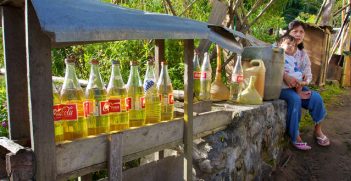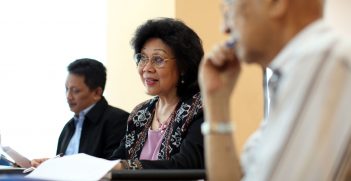Nickel Nationalism: Resource Downstreaming and the Attainment of Golden Indonesia 2045

2024 marks a transitionary year for Indonesian politics, following the country’s presidential election on 14 February. Focus will now be directed to how Indonesia’s newly elected leaders will harness the country’s growing mining sector to facilitate the attainment of the Golden Indonesia 2045 vision.
The recent election of Joko Widodo’s son Gibran Rakabuming Raka as vice president of Indonesia has been subject to scrutiny, with some going as far as to label it a dynastic political practice. Others, however, have expressed tentative hopes that with Gibran in office, alongside President-elect Prabowo Subianto, Joko Widodo’s political agenda will be continued somewhat seamlessly despite the change in government administration this October.
Per Indonesia’s constitutional limits on presidential terms, the country’s hugely popular president, affectionately nicknamed “Jokowi,” will step down in October following a ten-year term in office. Jokowi’s popularity stems from several factors, including his articulation of a Golden Indonesia 2045 policy and an aspirational and widely supported plan to expand Indonesia’s economy to become the world’s fifth largest in the same year that Indonesia celebrates a century of independence.
Undoubtedly, the attainment of Golden Indonesia status requires significant structural change. Hilirisasi, or downstreaming, represents one such economic reform. While Indonesia has engaged in forms of resource downstreaming since 2009, the nation’s most comprehensive downstreaming legislation was introduced in 2019 when the export of 1.8 percent grade nickel ore was banned entirely. The premise of the law was relatively simple. If nickel was not only mined but also refined in Indonesia, the country’s value-adding capacity for its exports would increase. From this policy, three foreseeable economic benefits were likely to be achieved: the expansion of domestic employment, the attraction of diverse sources of foreign investment, and sustained increases in Gross Domestic Product.
Under the Prabowo-Gibran pairing, resource nationalism will be continued, with Prabowo expressing emphatic support for downstreaming and its accompanying benefits. The question that stems from this is whether the new leaders will address the costs generated by resource nationalism or if the increasing value of Indonesian exports will continue to be the sole focus of downstreaming’s implications?
Domestically, nickel nationalism has been largely embraced as a means of boosting economic growth and employment. It has not been met with the same positive sentiment internationally. A decision in a case brought by the European Union against Indonesia in 2019 at the World Trade Organization labelled the policy as a trade restrictive measure. The matter was a catalyst for ongoing issues between Indonesia and the EU arising from downstreaming regulations, with Indonesia launching a retaliatory case in 2023 against countervailing duties imposed by the EU on Indonesian stainless-steel exports. Indonesia’s nickel nationalism has evidently given rise to tensions between Indonesia and powerful trade blocs, raising questions about what the optimal balance is between protecting the country’s domestic economic interests and its international trade engagement.
Moreover, downstreaming policies have fallen short of establishing Indonesia as a global lithium-ion battery manufacturing capital. Jokowi expressed great enthusiasm for the establishment of Indonesia as a global hub for lithium-ion battery production, a key component of electric vehicles (EV) manufacturing. Given the rapid pace at which EVs are being embraced globally, this would undoubtedly be a marked success of the 2019 laws. While Jokowi managed to secure meetings with EV-market leader Tesla and the company’s founder Elon Musk in 2022, the dialogues were overshadowed by an open letter sent by a group of climate activist organisations urging Tesla to avoid manufacturing in Indonesia due to the environmental atrocities being committed by actors in the nickel industry. The letter was clearly persuasive, the following year Tesla selected Malaysia as its next battery manufacturing centre.
The conflicting effects of resource downstreaming are also evident in the impacts of the policy on local communities and traditional employment streams. A key premise of nickel nationalism was that it would create new employment avenues by expanding the number, and scale, of domestic refineries and smelters. While this is a relatively straightforward argument, and downstreaming certainly has opened new employment opportunities in the domestic market, this has occurred at the direct expense of traditional employment. Take Obi Island, a small and nickel-rich island located in the North of the archipelago, near the Maluku province. Carcinogenic chemicals have invaded the island’s water streams, decimating fish populations and restricting the income-generating capacity of local fisherman. Indeed, residents of Obi Island can now seek employment in local nickel refineries, but is the cost of this, the erosion of traditional cultural practices, worth it?
While the above highlights weaknesses in nickel nationalism and resource downstreaming more broadly, it is not to say the policy is fundamentally or entirely flawed. Downstreaming has multiplied the value of Indonesian nickel exports five-fold since 2012, providing valuable injections into the domestic economy. However, the issue arises when domestic economic benefits are the sole measure of the policy’s success, and without regard to the influence of downstreaming on global perceptions of Indonesia as a trade partner or to the devastating effects of such “green” economic reform on the country’s environment.
What does this mean for the new president and his running mate? It is clear that Prabowo intends to continue downstreaming and resource nationalism, a lasting mark of Jokowi’s legacy in Indonesian politics. To ensure the continued benefits of downstreaming in Indonesia, Prabowo and Gibran should adopt a more holistic view of what constitutes “success” with respect to downstreaming by giving consideration to the effects of the policy on local communities, the nature of the country’s bilateral trade relations under downstreaming laws, and the long-term feasibility of the policy for Indonesia’s natural environment. Such considerations will enable Indonesia to achieve more sustainable economic growth at a lower cost trade-off as the country works towards its Golden Indonesia economic era in a post-Jokowi political and economic landscape.
Amy Mance is a 2023 Euan Crone Scholarship recipient and has recently returned from the six-week ACICIS Business Professional Practicum in Jakarta, Indonesia. She is an undergraduate student studying a Bachelor of Laws and Bachelor of Commerce (Economics) at Curtin University and a Diploma of Indonesian through Deakin University.
This article is published under a Creative Commons Licence and may be republished with attribution.





